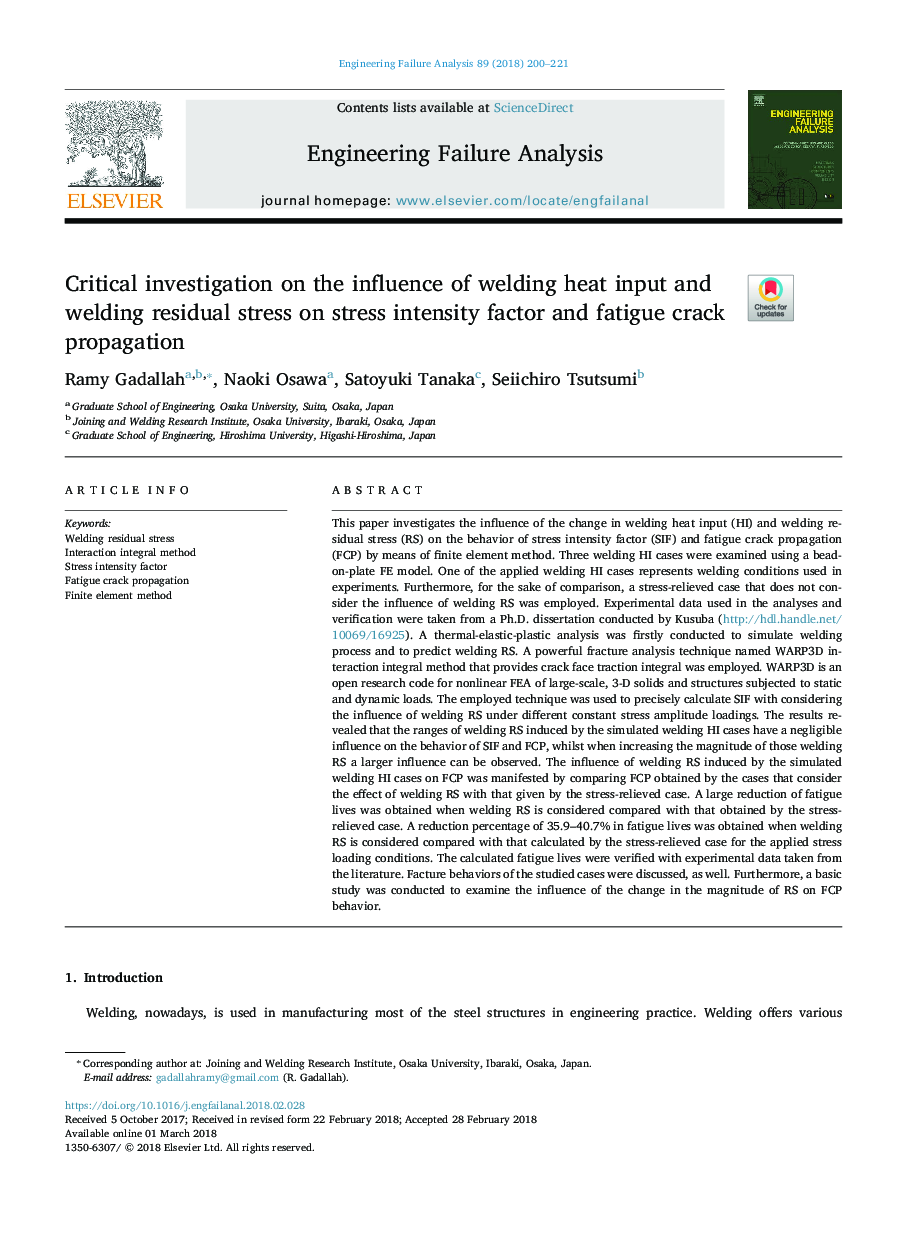| کد مقاله | کد نشریه | سال انتشار | مقاله انگلیسی | نسخه تمام متن |
|---|---|---|---|---|
| 7167482 | 1462937 | 2018 | 22 صفحه PDF | دانلود رایگان |
عنوان انگلیسی مقاله ISI
Critical investigation on the influence of welding heat input and welding residual stress on stress intensity factor and fatigue crack propagation
ترجمه فارسی عنوان
تحقیقات انتقادی در مورد تاثیر گرمادهی جوشکاری و تنش باقی مانده جوشکاری بر شدت تنش و ترویج ترک خستگی
دانلود مقاله + سفارش ترجمه
دانلود مقاله ISI انگلیسی
رایگان برای ایرانیان
کلمات کلیدی
استرس باقی مانده جوشکاری، روش انتگرال تعامل، فاکتور شدت تنش ترویج ترک خستگی، روش عنصر محدود
موضوعات مرتبط
مهندسی و علوم پایه
سایر رشته های مهندسی
مهندسی صنعتی و تولید
چکیده انگلیسی
This paper investigates the influence of the change in welding heat input (HI) and welding residual stress (RS) on the behavior of stress intensity factor (SIF) and fatigue crack propagation (FCP) by means of finite element method. Three welding HI cases were examined using a bead-on-plate FE model. One of the applied welding HI cases represents welding conditions used in experiments. Furthermore, for the sake of comparison, a stress-relieved case that does not consider the influence of welding RS was employed. Experimental data used in the analyses and verification were taken from a Ph.D. dissertation conducted by Kusuba (http://hdl.handle.net/10069/16925). A thermal-elastic-plastic analysis was firstly conducted to simulate welding process and to predict welding RS. A powerful fracture analysis technique named WARP3D interaction integral method that provides crack face traction integral was employed. WARP3D is an open research code for nonlinear FEA of large-scale, 3-D solids and structures subjected to static and dynamic loads. The employed technique was used to precisely calculate SIF with considering the influence of welding RS under different constant stress amplitude loadings. The results revealed that the ranges of welding RS induced by the simulated welding HI cases have a negligible influence on the behavior of SIF and FCP, whilst when increasing the magnitude of those welding RS a larger influence can be observed. The influence of welding RS induced by the simulated welding HI cases on FCP was manifested by comparing FCP obtained by the cases that consider the effect of welding RS with that given by the stress-relieved case. A large reduction of fatigue lives was obtained when welding RS is considered compared with that obtained by the stress-relieved case. A reduction percentage of 35.9-40.7% in fatigue lives was obtained when welding RS is considered compared with that calculated by the stress-relieved case for the applied stress loading conditions. The calculated fatigue lives were verified with experimental data taken from the literature. Facture behaviors of the studied cases were discussed, as well. Furthermore, a basic study was conducted to examine the influence of the change in the magnitude of RS on FCP behavior.
ناشر
Database: Elsevier - ScienceDirect (ساینس دایرکت)
Journal: Engineering Failure Analysis - Volume 89, July 2018, Pages 200-221
Journal: Engineering Failure Analysis - Volume 89, July 2018, Pages 200-221
نویسندگان
Ramy Gadallah, Naoki Osawa, Satoyuki Tanaka, Seiichiro Tsutsumi,
